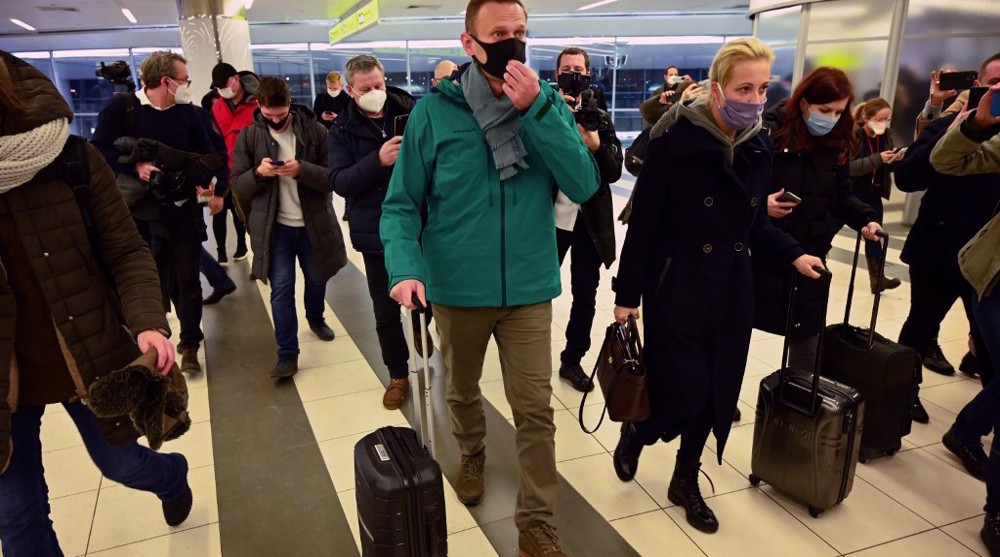Navalny arrest: Russia urges West to stop meddling, deal with own issues
In the wake of the arrest of Russian opposition figure Alexey Navalny in Moscow, the US and several European counties have called for his “immediate release.” Moscow decried their interference in its internal affairs, urging them to deal with their own issues, instead.
Russian police detained Navalny upon arrival at Moscow’s Sheremetyevo Airport from Germany on Sunday, five months after he was transferred to a hospital in Berlin, to be treated for what the West alleged had been a nerve-agent attack by Moscow.
Russia denied the allegations, calling them as “a provocation of Western intelligence services aimed at introducing sanctions against Russia.”
The two sides have been involved in a political standoff that has lingered for months.
Russia has imposed sanctions against a number of European officials in a tit-for-tat move after the European Union adopted punitive measures against Moscow.
Reacting to Navalny’s detention, US Secretary of State Michael Pompeo said Washington “strongly condemns Russia’s decision to arrest Aleksey Navalny.”
“We note with grave concern that his detention is the latest in a series of attempts to silence Navalny and other opposition figures and independent voices who are critical of Russian authorities," he said.
Pompeo also called for his “immediate and unconditional release."
US President-elect Joe Biden’s National Security Advisor Jake Sullivan also called on Moscow to “immediately release” Navalny.
“The Kremlin’s attacks on Navalny are not just a violation of human rights, but an affront to the Russian people who want their voices heard," he said in a tweet.
In response to Sullivan and “other foreign public figures,” Russia’s Foreign Ministry spokeswoman Maria Zakharova, said they needed to “deal with your domestic problems.”
“Have respect for international law, do not interfere with the national law of sovereign countries and deal with your own domestic problems,” she said in a Facebook post.
Among those, who criticized Navalny’s detention, was Italy’s Foreign Minister Luigi Di Maio, who described the move as “a very serious matter.”
German Foreign Minister Heiko Maas also called for the opposition figure's immediate release.
"Russia is bound by its own Constitution and by international obligations to the principle of the rule of law and to the protection of civil rights. These principles must, of course, be applied to Alexei Navalny as well. He should be released immediately", Maas said in a statement.
Britain's Foreign Secretary Dominic Raab also joined the club of Russia's critics.
"It is appalling that Alexey Navalny, the victim of a despicable crime, has been detained by Russian authorities," Raab wrote on Twitter on Monday.
And French Foreign Ministry spokeswoman, Agnes von der Muhll, who expressed “great concern” over the arrest.
“France takes note with great concern of the arrest in Russia of Mr. Alexei Navalny,” she said. “With its European partners, it is following the situation with the utmost vigilance and calls for his immediate release.”
EU chief Ursula von der Leyen also voiced her criticism of the detention.
"I condemn the detention of Alexei Navalny," she said in a statement Monday. "The Russian authorities must immediately release him and ensure his safety."
European Council President Charles Michel also reacted to the arrest, saying in a Twitter post, “I call on Russian authorities to immediately release him.”
European Parliament President David Sassoli also tweeted, "We ask the Russian authorities for his immediate release. We are ready to invite him to the European Parliament.”
The European Parliament’s Monday session will discuss Navalny’s arrest, Russian website Tass reported, citing a diplomatic source, who said that the bloc may release a joint statement later in the day.
EU member Lithuania said it will ask the union to impose new sanctions on Moscow.
Lithuanian Foreign Ministry said that neighboring EU countries Latvia and Estonia will also work towards “imposition of restrictive measures” against Russia.
“We urge Russia to immediately release Navalny and to arraign those responsible for the attempt on his life,” said Lithuanian Foreign Affairs Minister Gabrielius Landsbergis.
Amnesty International also denounced the arrest, calling Navalny “a prisoner of conscience.”
Navalny, who is arrested for violating the terms of a suspended sentence he initially received in 2014, would be remained behind bars, pending a court hearing, according to Russian judiciary officials.
Occupation of Syria’s highest peak Mount Hermon part of ‘Greater Israel’ project
Iran: Syrian people will decide their future without foreign interference
IRGC says Iran’s power exceeds borders, warns enemies to adjust themselves
Dozens detained, several wounded in Israeli raids in West Bank
‘Ethnic cleansing’: Hamas blasts Israeli attacks on Gaza hospital amid intl. silence
Saudi delegation meets HTS leader at presidential palace in Damascus
Relentless Israeli ceasefire violations justify need for self-defense: Lebanese MP
Tel Aviv tells Damascus Israeli forces will remain in occupied territory: Report















 This makes it easy to access the Press TV website
This makes it easy to access the Press TV website